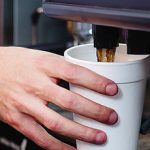IoT Business Case: Contract Enforcement
When you have a contract to replenish consumables or usage of something, accurate reporting can make a big difference. Not only does it ensure your customer has the supplies they need, but it also ensures that you get paid sooner. This brings us to our next business case paradigm: Contract Enforcement.
Before the technological advances of IoT, someone would have to physically check the supply or usage of something. Or you would need to rely on self-reporting or reorders from the customer. Now an IoT device can measure and report the usage of something in accordance with a contract.
- Using an IoT device for contract enforcement is applicable in many situations. Below are a few examples:
- Heavy construction equipment – Once a leasing company delivers equipment to the site, they normally wouldn’t know how much it is being used unless someone goes to look at the meter. Since most of the revenue is made through hourly fees, this delays payments from the customer. The leasing company can put a device on the equipment with GPS and usage tracking. It also could report on where the equipment is being used, environmental factors, and the equipment’s condition. This can ensure it is being used in compliance with the contract, enable billing for usage as it happens (vs. all at the end) and allow for preventative maintenance.
- Beverage distribution – A beverage distributor provides equipment to a customer with a contract to sell them the consumable/beverage when supplies are low. Often the contract is such that the equipment is free, but you must buy the consumables from that vendor. Normally supplies would be replenished when the customer makes an order, or by automatic deliveries. By adding a wireless device, the distributor can automatically track usage of the consumable and send only the needed supplies, only when they are needed. They can also ensure customers are using the intended products and check proactively on equipment health, cleaning and quality analysis
- Vehicle loans – When car dealerships let customers pay for a vehicle in installments, they put a significant amount of capital on the line. A GPS receiver and cellular radio can be installed to track usage and vehicle health, which can be especially useful for leased vehicles. It also can help with payments, as a remote shut off can be triggered for default on payments. This also allows dealerships to charge less interest and allow for higher value vehicles to be purchased.
The preceding examples also tie back to the business drivers of making money, saving money, legal compliance and reputation protection. Is your company losing money due to an inability to efficiently check customer usage? Are you wasting valuable worker hours due to unnecessary site visits? Do you want to reduce risk and further safeguard the reputation of your products? If so, a customized wireless solution may be the answer.
As with any IoT project, it is important to have experience on your side to meet certification requirements and customer demands. F3 can help in your quest to bring any custom wireless product to market.




